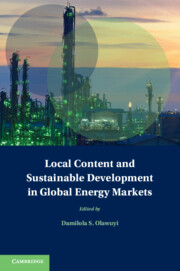Refine search
Actions for selected content:
2 results
11 - For Better or for Worse
- from Part III - Comparative Politics
-
-
- Book:
- Stability and Politicization in Climate Governance
- Published online:
- 07 August 2025
- Print publication:
- 21 August 2025, pp 163-175
-
- Chapter
-
- You have access
- Open access
- HTML
- Export citation

Local Content and Sustainable Development in Global Energy Markets
-
- Published online:
- 05 March 2021
- Print publication:
- 04 March 2021
